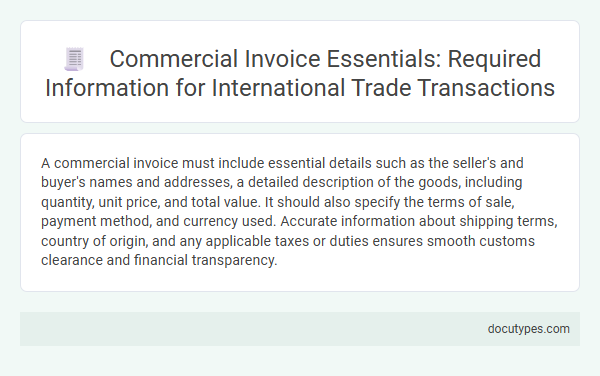A commercial invoice must include essential details such as the seller's and buyer's names and addresses, a detailed description of the goods, including quantity, unit price, and total value. It should also specify the terms of sale, payment method, and currency used. Accurate information about shipping terms, country of origin, and any applicable taxes or duties ensures smooth customs clearance and financial transparency.
Introduction to Commercial Invoices in International Trade
What essential details must be included on a commercial invoice for international trade? A commercial invoice serves as a critical document that facilitates customs clearance and payment between buyers and sellers. Your commercial invoice should clearly detail the transaction specifics to ensure seamless trade across borders.
Importance of Accurate Commercial Invoicing
A commercial invoice must include essential details such as the seller's and buyer's information, a clear description of the goods, quantities, unit prices, total value, and the country of origin. Accurate commercial invoicing is crucial for customs clearance and financial record-keeping.
The precision of details on your commercial invoice ensures smooth international trade transactions by minimizing delays and avoiding penalties. It helps customs authorities correctly assess duties and taxes, preventing disputes and additional costs. Maintaining accuracy protects your business reputation and streamlines payment processing.
Shipper and Consignee Details
A commercial invoice must include detailed information about both the shipper and the consignee to ensure smooth customs clearance. The shipper's details typically comprise the full company name, address, and contact information, which verifies the origin of the goods. Your consignee's information should feature the recipient's name, complete address, and contact number to confirm the destination and facilitate accurate delivery.
Comprehensive Product Descriptions
A commercial invoice must include comprehensive product descriptions to ensure clarity in international trade and customs processing. Detailed information such as product name, quantity, unit price, and HS codes helps verify the nature and value of the goods. Accurate descriptions reduce the risk of shipment delays, incorrect duties, and compliance issues with customs authorities.
Harmonized System (HS) Codes and Classification
A commercial invoice must contain specific details to ensure smooth international trade and customs clearance. Correct Harmonized System (HS) Codes and accurate classification of goods are essential components.
- Harmonized System (HS) Codes inclusion - These standardized numerical codes classify products globally and determine applicable tariffs and duties.
- Accurate classification of goods - Proper classification according to HS codes ensures compliance with customs regulations and prevents shipment delays.
- Clear product descriptions - Detailed descriptions aligned with HS codes help customs officials identify your goods and apply correct tax rates.
Quantity, Unit Price, and Total Value
A commercial invoice must clearly present essential financial details to ensure accurate transaction processing. Key information such as quantity, unit price, and total value provides a transparent overview of the sale and supports customs clearance.
- Quantity - Specifies the exact number of units being sold, which helps verify the shipment size and inventory control.
- Unit Price - Indicates the cost per individual item, allowing calculation of pricing accuracy and comparison.
- Total Value - Reflects the cumulative price for all units, essential for payment, taxation, and customs valuation.
Currency and Payment Terms
| Detail | Description |
|---|---|
| Currency | The commercial invoice must clearly specify the currency used for the transaction. This information is crucial for accurate payment processing and avoids confusion or disputes related to exchange rates. Common currencies include USD, EUR, GBP, and JPY, but it should match the agreed currency between buyer and seller. |
| Payment Terms | Payment terms define the timeline and method for payment completion. Typical terms include "Net 30," "Cash in Advance," or "Letter of Credit." Including precise payment terms protects both parties by establishing when and how the payment should be made, reducing risks of delays or defaults. |
Shipping Details and Incoterms
A commercial invoice must include precise shipping details to ensure smooth customs clearance and accurate delivery. Incoterms clarify the responsibilities between buyers and sellers regarding shipping costs and risk transfer.
- Shipping Address - Specifies the exact destination where goods are to be delivered, reducing errors in shipment.
- Carrier Information - Identifies the transport company responsible for shipping, which aids in tracking and accountability.
- Incoterms - Defines the terms of shipment, including who pays for shipping, insurance, and import duties, ensuring clear contractual obligations.
Including detailed shipping information and correct Incoterms on a commercial invoice is essential for legal compliance and efficient international trade.
Certifications and Regulatory Statements
Certifications and regulatory statements on a commercial invoice are essential for ensuring compliance with international trade laws. These details verify that your shipment meets specific legal and safety standards required by the importing country.
Common certifications include origin certificates, phytosanitary certificates, and compliance with product-specific regulations such as FDA or CE markings. Including accurate regulatory statements helps prevent delays, fines, or shipment rejections during customs clearance.
What Details Must Be Included on a Commercial Invoice? Infographic

